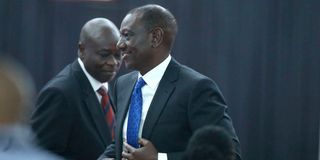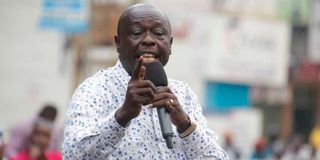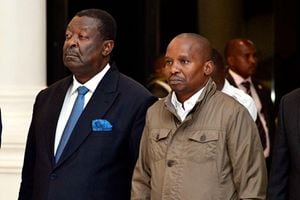
Deputy President Rigathi Gachagua speaks at PEFA Church in Thika town, Kiambu County on September 22, 2024. Inset: President William Ruto.
In the high-stakes world of Kenyan politics, power is as much about restraint as it is about ambition, a lesson impeached Deputy President Rigathi Gachagua learned the hard way.
Once hailed as a pivotal figure in the Kenya Kwanza government, Mr Gachagua’s missteps reflect a disregard for the age-old principles of power as captured in Robert Greene’s book, The 48 Laws of Power.
By attempting to outshine his boss, openly clashing with the president’s inner circle and disregarding the shifting tides of political alliances, Mr Gachagua broke essential rules of political survival.
For a politician who is now fighting his impeachment in court, the fall from grace has been swift and unforgiving, with the political downfall traced through the lens of six laws of power he flouted, each one representing a critical misstep in his approach to governance.
Rule 1: Never outshine the master: Make those above you feel superior

President William Ruto and Deputy President Rigathi Gachagua during the National Prayer Breakfast at Safari Park Hotel in Nairobi on May 30, 2024.
Mr Gachagua’s political journey was once marked by shrewd alliances and tactical political manoeuvring. From a one-term Mathira MP to serving just two years as Deputy President, Mr Gachagua’s rise and fall now stand as a cautionary tale in Kenya’s power politics.
In a previous interview, President William Ruto’s ruling UDA Party interim Secretary-General Hassan Omar had warned key Gachagua allies to drop the idea of a co-presidency. This followed complaints that some meetings wth Mt Kenya leaders were being held by State House in the absence of the second in command.
“There is no co-presidency to occasion an entitlement on the part of any leader and neither is there a gatekeeper for any region or for any set of MPs,” Mr
Mr Gachagua had previously in August warned that those who defy his Mt Kenya unity push are likely to suffer defeat in the next election.
“As we head for the 2027 elections take note that it will be very competitive. You know I am that person who listens to the ground because some serious decisions shave been made,” he said in an ultimatum against President Ruto’s allies on August 17.
He also in later rallies and interviews said Dr Ruto owed the 2022 win to him courtesy of the Mt Kenya vote. He consequently said if he was to be kicked out then the President should also go.
Political analyst Mark Situma explains that in his attempt to consolidate political influence, the embattled Deputy President appears to have made the critical error of underestimating President Ruto’s hold on the political establishment.
“He declared war on the president’s inner circle believing his own political capital was unshakable. This overestimation of his strength led him to pick fights with key players in Ruto’s camp, further isolating him from the power base he needed to thrive in,” said Mr Situma.
Analyst Jesse Karanja suggests that Gachagua’s political ambitions may have contributed to his downfall. “Mr Gachagua's attempts to outshine his boss and his ambitions to become President were his biggest mistakes. Dr Ruto being a political schemer, had to rein in his over-ambitious deputy,” said Mr Karanja.
Recently, after being discharged from hospital, Mr Gachagua also accused his boss of political betrayal.
"I am shocked on how my brother William Ruto with whom l worked very hard to form government has betrayed me. I did not know President Ruto can be this vicious. I am shocked how a man l helped to become president, a man l was persecuted for supporting has now turned against me, when l was fighting for my life in hospital,” he stated.
"How cruel can you be Mr President,” added Mr Gachagua revealing that his security had been withdrawn and his employees ordered to go on a compulsory leave.
Rule 3: Conceal your intentions (Keep people off-balance and in the dark)/Rule 47: Do not go past the mark you aimed for: Know when to stop
The impeached Deputy President’s political ambitions became evident early in his tenure, leaving little to imagination. Mr Situma told Nation.Africa Gachagua’s constant vocal presence alienated allies and portrayed him as unpredictable, risking support even within his own base in Mt Kenya.
In the National Assembly, at least 40 Mt Kenya MPs voted to impeach Mr Gachagua with his loose grip on his backyard appearing to be his political Achilles heel. Majority of legislators from the region had weeks earlier disowned him for Prof Kithure Kindiki.
By showing his cards early, Mr Situma explains, Mr Gachagua left himself vulnerable to his opponents and gave his critics leverage violating Greene’s warning to “conceal your intentions.”
“He openly revealed his desire for greater influence giving opponents ample time to counter his moves. In power politics, subtlety and secrecy are key but yet Gachagua’s tendency to lay bare his plans weakened his strategic position and allowed rivals including the president to outmaneuver him,” he said.
Political analyst Steve Kabita added: "President Ruto is a master of the 48 Laws of Power...He understands that once you rise to power you must be wary of those who helped you as they could conspire against you. He is simply preparing for 2027. The current realignment brings together political allies with a long history of collaboration, albeit with intermittent pauses as they pursued individual ambitions. Dr Ruto, (Raila) Odinga, and Musalia Mudavadi have previously worked together and are now crafting a 2027 political coalition.”
Mr Situma says that while President Ruto was mending fences with opponents from the 2022 elections led by Azimio la Umoja leader Raila Odinga, Mr Gachagua continued to wage battle against them, failing to recognise the new political alignment forming.
His inability to pivot and adapt to the changing environment showed a lack of foresight leaving him vulnerable as Dr Ruto’s focus shifted toward coalition-building and national unity.
Such was the fractured relationship between retired president Uhuru Kenyatta and Dr Ruto who by then the deputy president. Also, Mr Situma said, Mr Gachagua’s political ambitions became evident early in his tenure leaving little to the imagination.
Mr Gachagua has emerged as the primary casualty in these political shifts, according to Mr Kabita, after he was ousted by Parliament with votes from both Kenya Kwanza and opposition Members of Parliament
The impeached Deputy President’s political ambitions became evident early in his tenure, leaving little to imagination.
Mr Situma told Nation.Africa Gachagua’s constant vocal presence alienated allies and portrayed him as unpredictable, risking support even within his own base in Mt Kenya.
In the National Assembly, at least 40 Mt Kenya MPs voted to impeach Mr Gachagua with his loose grip on his backyard appearing to be his political Achilles heel. Majority of legislators from the region had weeks earlier disowned him for Prof Kithure Kindiki.
By showing his cards early, Mr Situma explains, Mr Gachagua left himself vulnerable to his opponents and gave his critics leverage violating Greene’s warning to “conceal your intentions.”
“He openly revealed his desire for greater influence giving opponents ample time to counter his moves. In power politics, subtlety and secrecy are key but yet Gachagua’s tendency to lay bare his plans weakened his strategic position and allowed rivals including the president to outmaneuver him,” he said.
Political analyst Steve Kabita added: "President Ruto is a master of the 48 Laws of Power as outlined in Robert Greene's book. He understands that once you rise to power you must be wary of those who helped you as they could conspire against you. He is simply preparing for 2027. The current realignment brings together political allies with a long history of collaboration, albeit with intermittent pauses as they pursued individual ambitions. Dr Ruto, (Raila) Odinga, and Musalia Mudavadi have previously worked together and are now crafting a 2027 political coalition.”
Mr Situma says that while President Ruto was mending fences with opponents from the 2022 elections led by Azimio la Umoja leader Raila Odinga, Mr Gachagua continued to wage battle against them, failing to recognise the new political alignment forming.
His inability to pivot and adapt to the changing environment showed a lack of foresight leaving him vulnerable as Dr Ruto’s focus shifted toward coalition-building and national unity.
Such was the fractured relationship between retired president Uhuru Kenyatta and Dr Ruto who by then the deputy president.
Also, Mr Situma said, Mr Gachagua’s political ambitions became evident early in his tenure leaving little to the imagination.
Mr Gachagua has emerged as the primary casualty in these political shifts, according to Mr Kabita, after he was ousted by Parliament with votes from both Kenya Kwanza and opposition Members of Parliament.
Rule 4: Always say less than necessary

Deputy President Rigathi Gachagua.
In the political arena, Mr Gachagua often referred himself as an honest or truthful man who tells it . He has often exhibited a sharp tongue, which aligns with the fourth law of power: "Always say less than necessary."
His bold statements and public outbursts drew attention but it has also led to significant backlash. According to Mr Kabita Motua, another political analyst, Gachagua's failure to temper his words or consider their implications put him at odds with both allies and adversaries alike.
“Gachagua's sharp tongue has proven to be a double-edged sword contributing to his current political troubles rather than reinforcing his power,” he said.
According to Mr Motua, perhaps one of Gachagua’s most disastrous moves was challenging the president’s chief advisors and security agencies, including the National Intelligence Service, after the June anti finance bill demonstrations that rocked most parts of the country.
While defending himself against the allegations that he demeaned NIS Director general Noordin Haji, Mr Gachagua said he had failed to advise the government on the public concerns regarding the withdrawn Finance Bill 2024 that lead to deaths and destruction.
But by declaring war on these powerful forces, Mr Motua says, Gachagua placed himself in direct conflict with the very people responsible for the president’s security and decision-making in critical areas.
“In power, fighting the unseen whisperers who guide the leader’s decisions is often a losing battle,” Mr Motua said.
Rule 30: Make your accomplishments seem effortless…Conceal the hard work
The impeached Deputy President also repeatedly invoked his role in securing the overwhelming vote for Dr Ruto in Mt Kenya, reminding the president of his contributions in delivering the region’s support.
While his efforts were crucial, continuously highlighting his role in Dr Ruto’s rise also appears to have become a sore point.
“He (Gachagua) failed to grasp the cardinal rule in politics—never outshine the boss. He overly emphasised his importance to his boss and to many in the president’s circle was that the subordinate was holding the leader hostage to their past contributions. Another glaring mistake was his failure to exercise restraint in public discourse.
“It’s true he is known for his blunt and often combative rhetoric but Gachagua was outspoken on sensitive political issues, frequently attacking opponents and airing grievances. That outspoken nature the inability to maintain discretion alienated key allies including from his own backyard,” said Mr Motua.
The impeachment of Rigathi Gachagua as Deputy President sent shockwaves throughout the political landscape, marking the dramatic fall of a once-powerful figure who misjudged the delicate dynamics of power.
A key player from Mt Kenya during the last General Election, Mr Gachagua’s rapid rise to national prominence was undone by a series of critical missteps.
His downfall appears to be the result of more than just political miscalculations, stemmed from a failure to navigate the intricate power dynamics between him and President William Ruto, with his political career ultimately cut short by the very laws of power he ignored.
It had become increasingly clear that the president and his deputy were no longer in political sync, with their differences spilling out into the public arena and proxy battles fought in parliament, press conferences and weekend rallies.
Rule 27: Play on people’s need to believe
The first real sign of trouble came as early as May, when Gachagua missed a national tree-planting exercise that involved the president, his cabinet, and other senior officials. Although he was scheduled to participate in Bomet County, he reportedly pulled out at the last minute due to a disagreement over the use of helicopters.
This tree-planting event was just one of several state functions Mr Gachagua failed to attend, raising eyebrows and signaling a growing rift.
After a week-long absence from the public eye he reappeared in his Nyeri base, alleging attempts to undermine him and curb his political ambitions.

Deputy President Rigathi Gachagua at Mawingu Trail on the slopes of Mt Kenya on March 18, 2023.
He claimed he had sought divine intervention in the Mt Kenya forest having taken a week for prayer and fasting.
“I had taken seven days away at the heart of Mt. Kenya for prayer, fasting, and meditation. Let those dreaming of removing me dream on, as there's no harm in dreaming,” Mr Gachagua said during a public address in Kirinyaga.
His fears materialised and he is know fighting to save his political career. his impeachment has seemingly dealt a blow to his political career.
dditional reporting by Eric Matara









